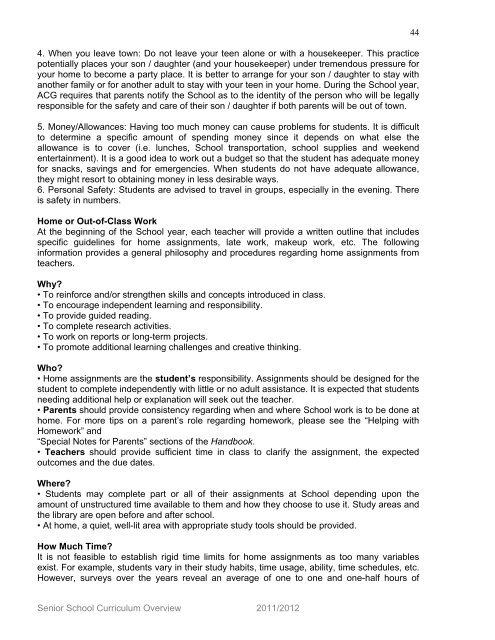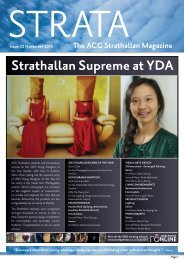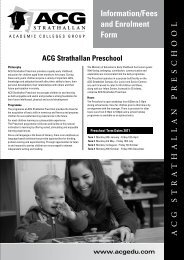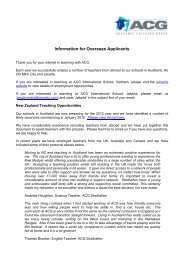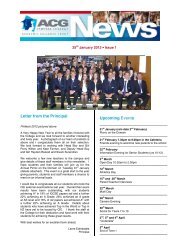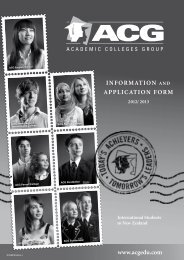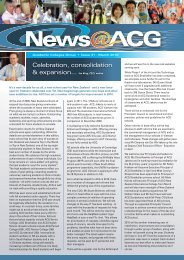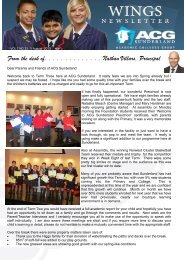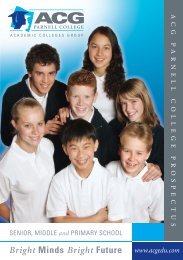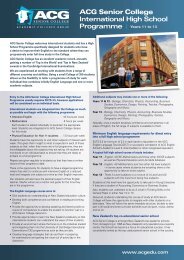ACG Senior School Curriculum Overview - The Academic Colleges ...
ACG Senior School Curriculum Overview - The Academic Colleges ...
ACG Senior School Curriculum Overview - The Academic Colleges ...
Create successful ePaper yourself
Turn your PDF publications into a flip-book with our unique Google optimized e-Paper software.
4. When you leave town: Do not leave your teen alone or with a housekeeper. This practicepotentially places your son / daughter (and your housekeeper) under tremendous pressure foryour home to become a party place. It is better to arrange for your son / daughter to stay withanother family or for another adult to stay with your teen in your home. During the <strong>School</strong> year,<strong>ACG</strong> requires that parents notify the <strong>School</strong> as to the identity of the person who will be legallyresponsible for the safety and care of their son / daughter if both parents will be out of town.5. Money/Allowances: Having too much money can cause problems for students. It is difficultto determine a specific amount of spending money since it depends on what else theallowance is to cover (i.e. lunches, <strong>School</strong> transportation, school supplies and weekendentertainment). It is a good idea to work out a budget so that the student has adequate moneyfor snacks, savings and for emergencies. When students do not have adequate allowance,they might resort to obtaining money in less desirable ways.6. Personal Safety: Students are advised to travel in groups, especially in the evening. <strong>The</strong>reis safety in numbers.Home or Out-of-Class WorkAt the beginning of the <strong>School</strong> year, each teacher will provide a written outline that includesspecific guidelines for home assignments, late work, makeup work, etc. <strong>The</strong> followinginformation provides a general philosophy and procedures regarding home assignments fromteachers.Why?• To reinforce and/or strengthen skills and concepts introduced in class.• To encourage independent learning and responsibility.• To provide guided reading.• To complete research activities.• To work on reports or long-term projects.• To promote additional learning challenges and creative thinking.Who?• Home assignments are the student’s responsibility. Assignments should be designed for thestudent to complete independently with little or no adult assistance. It is expected that studentsneeding additional help or explanation will seek out the teacher.• Parents should provide consistency regarding when and where <strong>School</strong> work is to be done athome. For more tips on a parent’s role regarding homework, please see the “Helping withHomework” and“Special Notes for Parents” sections of the Handbook.• Teachers should provide sufficient time in class to clarify the assignment, the expectedoutcomes and the due dates.Where?• Students may complete part or all of their assignments at <strong>School</strong> depending upon theamount of unstructured time available to them and how they choose to use it. Study areas andthe library are open before and after school.• At home, a quiet, well-lit area with appropriate study tools should be provided.How Much Time?It is not feasible to establish rigid time limits for home assignments as too many variablesexist. For example, students vary in their study habits, time usage, ability, time schedules, etc.However, surveys over the years reveal an average of one to one and one-half hours of44<strong>Senior</strong> <strong>School</strong> <strong>Curriculum</strong> <strong>Overview</strong> 2011/2012


